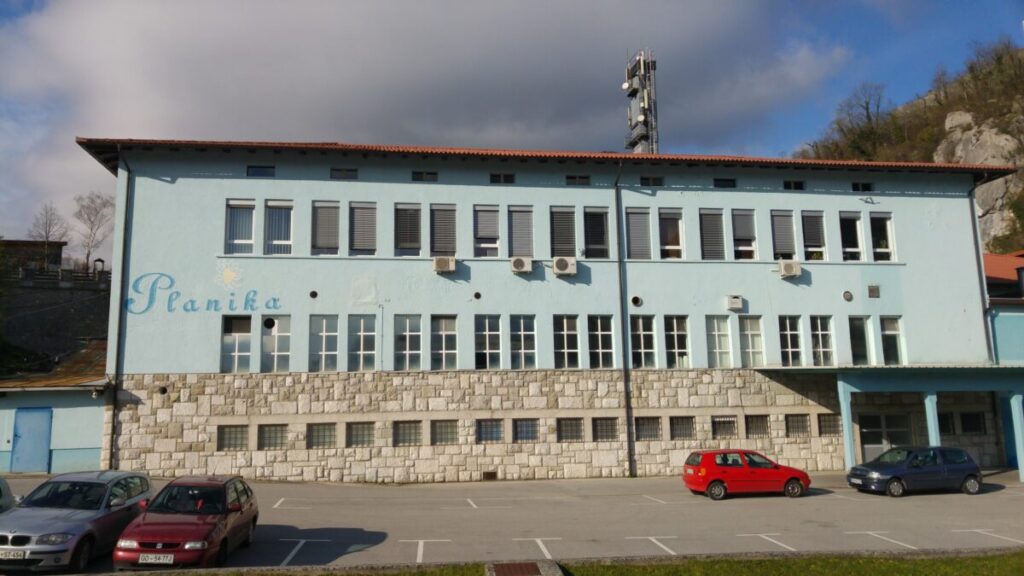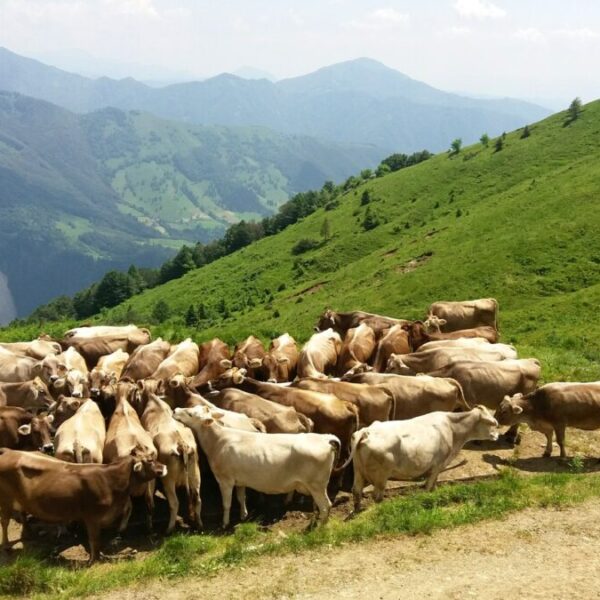Slovenia, as an alpine country, has a long tradition of dairy production, but more and more farmers are abandoning their activity due to difficult agricultural conditions. At the Planika dairy, which is 100% owned by the Tolmin agricultural cooperative, they strive to provide better working conditions for farmers and dairy employees. And even for the livestock that grazes a large part of the year in the surrounding meadows.
The steep mountainous terrains on the outskirts of the Alps are not suitable for vegetable farming, which is why dairy cattle farming has mainly developed in the mountain pastures of northwestern Slovenia. According to the latest data from the Ministry of Agriculture, farmers in the country raise over 90,000 dairy cows, producing around 210 liters per capita per year. As this exceeds national needs, Slovenia is an exporter of milk.
A agricultural cooperative manages the dairy factory.
The Planika dairy is the fifth largest dairy in Slovenia and produces products that can be found on the shelves of major stores throughout the country, but its business model is quite different from other dairies. Planika is owned by the Tolmin Agricultural Cooperative, which belongs to the farmers. "We only buy milk from local farmers in neighboring municipalities," explains dairy director Miran Božič. "Unfortunately, the number of farmers is decreasing year by year, we share the same fate here as in other regions of the country and Europe. Small farms are left without successors and thus give up cattle farming. Once the livestock leaves the barn, it never returns. And sometimes, a new tourist establishment is created in its place."
The Planika dairy also has its own organic farm in Bovec. "We raise about 150 heads of cattle, including 108 dairy cows which are our main source of organic milk," explains Božič. Planika produces about half a million liters of milk per year on its property and buys around 6.5 million liters of milk per year from 90 local farmers. In total, this adds up to 7 million liters per year.
A bonus in good years
The average purchase price of milk in the European Union is currently about a little less than 0.50 euros per liter. Planika buys milk at a higher price than other dairies in the country, as the director understands the difficult conditions of agriculture in the mountainous region of northwestern Slovenia. "The region of Soča is challenging for agriculture. Some farms that supply us with milk are even located at 1000 meters above sea level. Livestock feed production is also demanding." At the same time, if the dairy has a good year and manages to operate well, it pays a financial bonus to the farmers at the end of the year.

With these measures, they are trying to maintain cattle farming in a region that is not suitable for other forms of agriculture. "I think I can say that cattle farming in the Posočje region is based on the Planika dairy," adds Božič, who remains optimistic. Recently, some young farmers have even decided to build new barns. It is also thanks to them that the amount of milk delivered to the dairy remains stable for the time being.
Milk purchased from local farmers
The milk supply from small scattered farms in the surrounding hills poses a particular logistical challenge for the dairy. The new approach is that they do not need to collect the milk with tankers every day, but every two days. Indeed, farmers can cool the milk immediately after milking to 4 degrees Celsius, allowing them to store it until the next day. This way, the carbon footprint of transportation is further reduced, especially since the dairy already sources milk exclusively from local farmers.
Solar panels on the roof
The dairy farm is also very focused on sustainable development. They have installed solar panels on the roofs of the production buildings, which provide them with about 50% of their electricity. "As much as possible, we use recycled packaging. Our unique feature lies in the milk dispensers installed in some stores. The consumer buys a bottle for the first time and then refills it with milk, kefir, or organic yogurt each time," describes Božič.
The cows from the mountain farms spend a large part of the year outdoors and feed on fresh food, which is also reflected in the quality of the milk. "The cows from the Posočje region are ladies and young ladies. When spring arrives and the grass grows, farmers let their cattle graze outdoors. Even on the organic farm of Planika, the cattle graze for more than half of the year. Furthermore, here, all cows have their own name, not just identification numbers on their ears. On one hand, it is a tradition, on the other hand, it shows people's attitude towards cattle," emphasizes Božič.
A very natural milk
The dairy's particularity also lies in the fact that it follows traditional methods that advocate for minimal processing of milk. "Of course, we comply with all standards, but we pasteurize the milk at the lowest allowed temperature. We do not homogenize the milk, which is why a layer of cream forms on the surface of our milk bottle when it is in your fridge. It's a natural phenomenon. Just like if you buy milk directly from the farm, boil it, and a nice cream crust forms on top... That's how our milk is," proudly concludes Božič.
